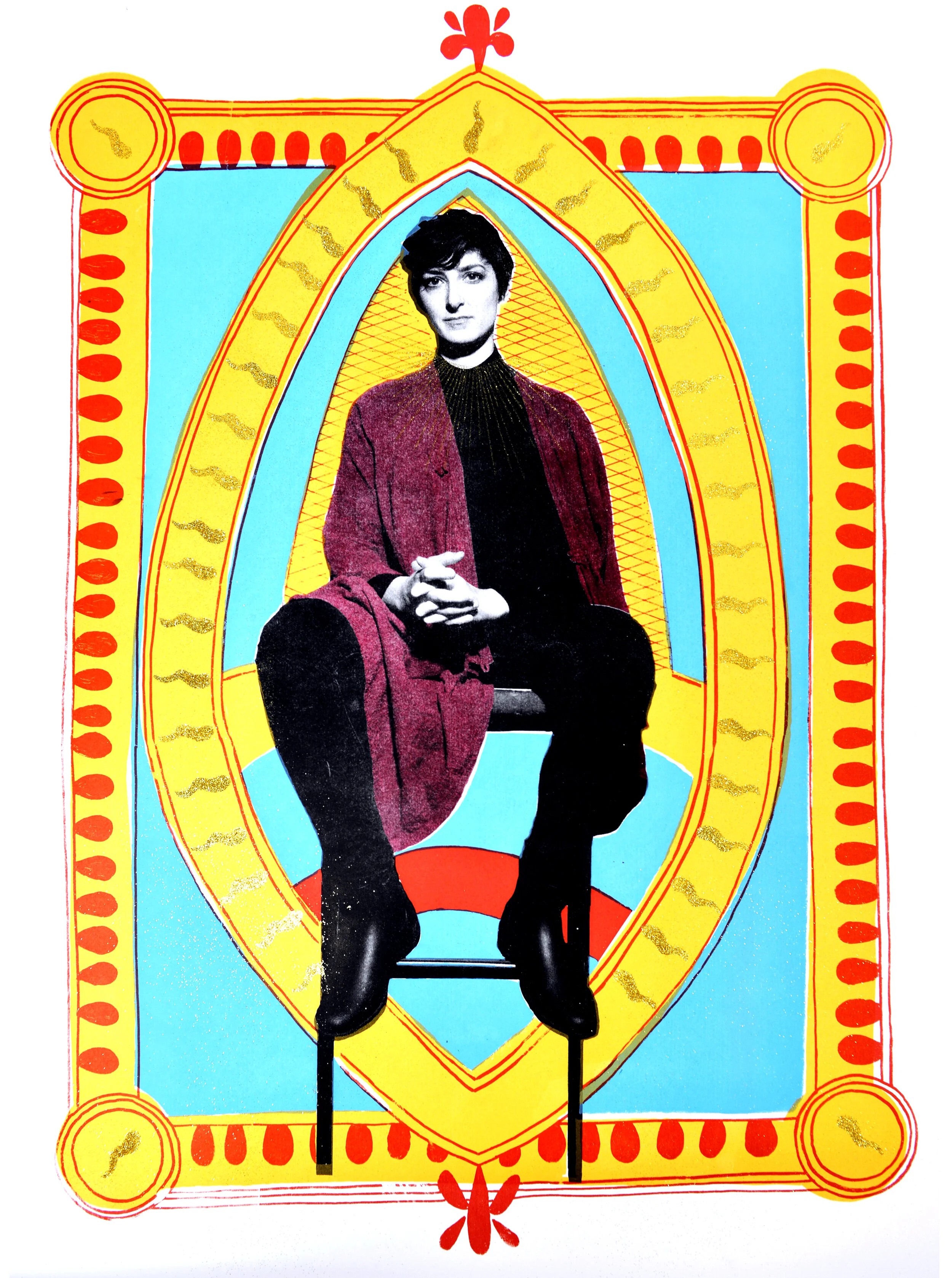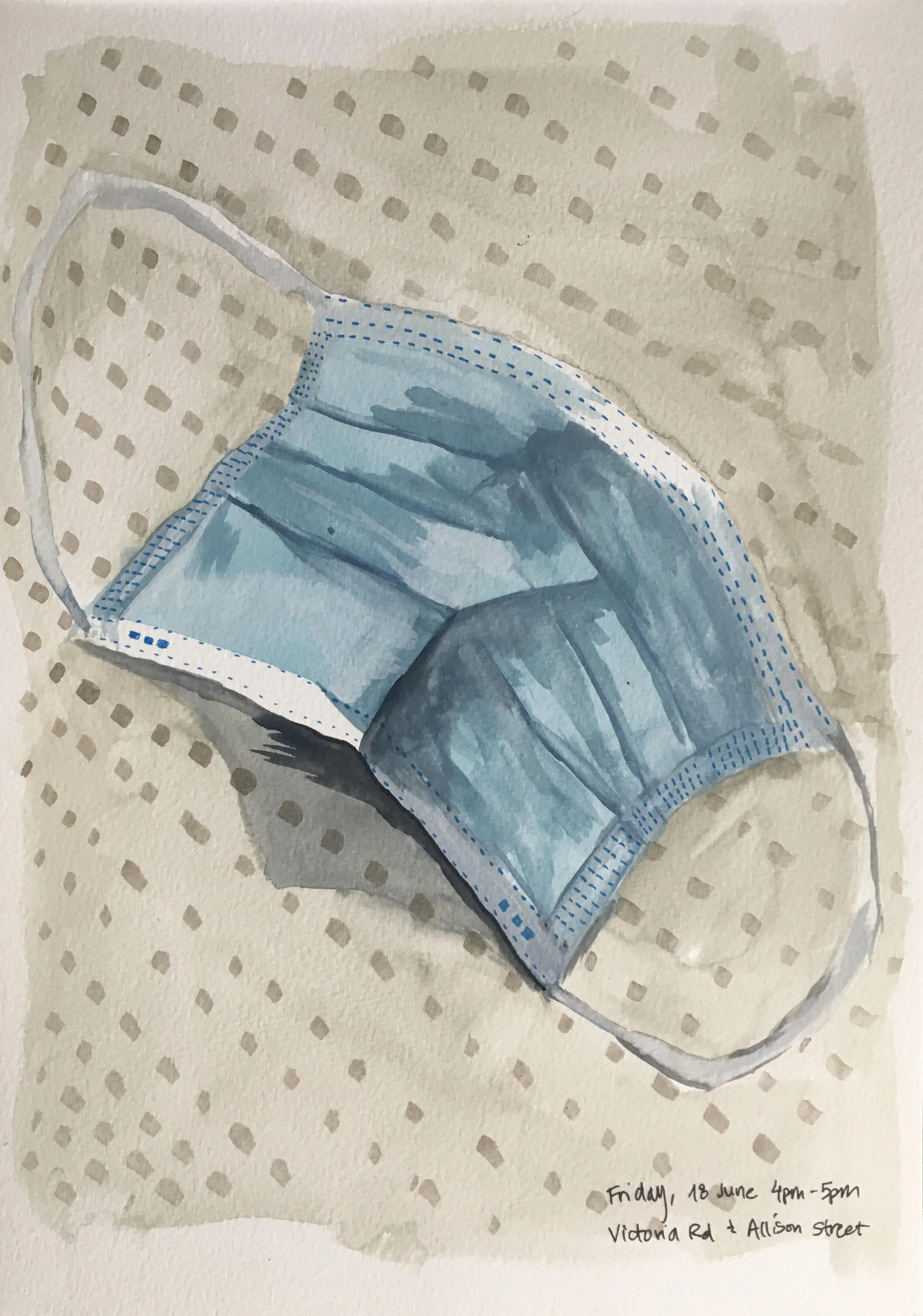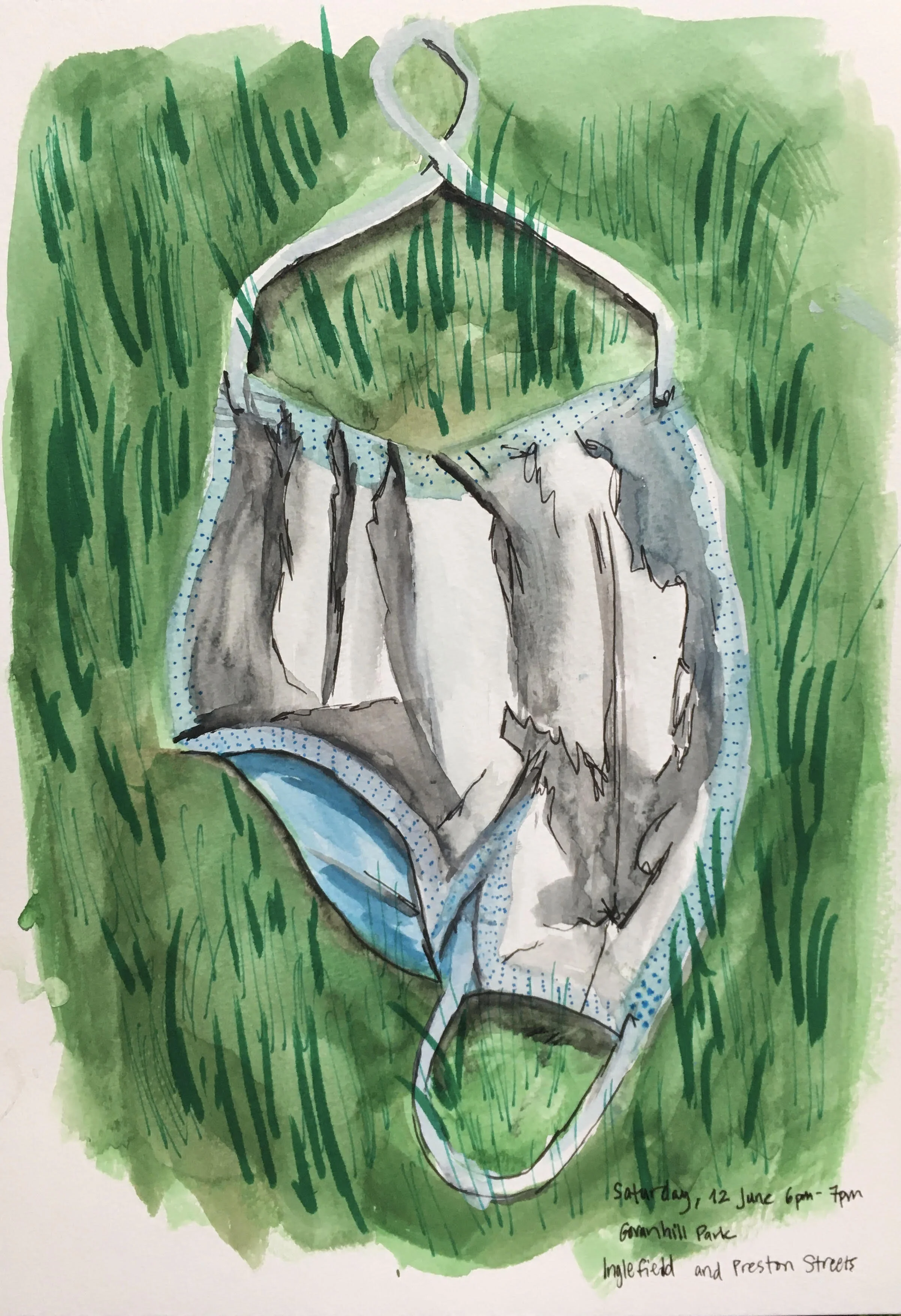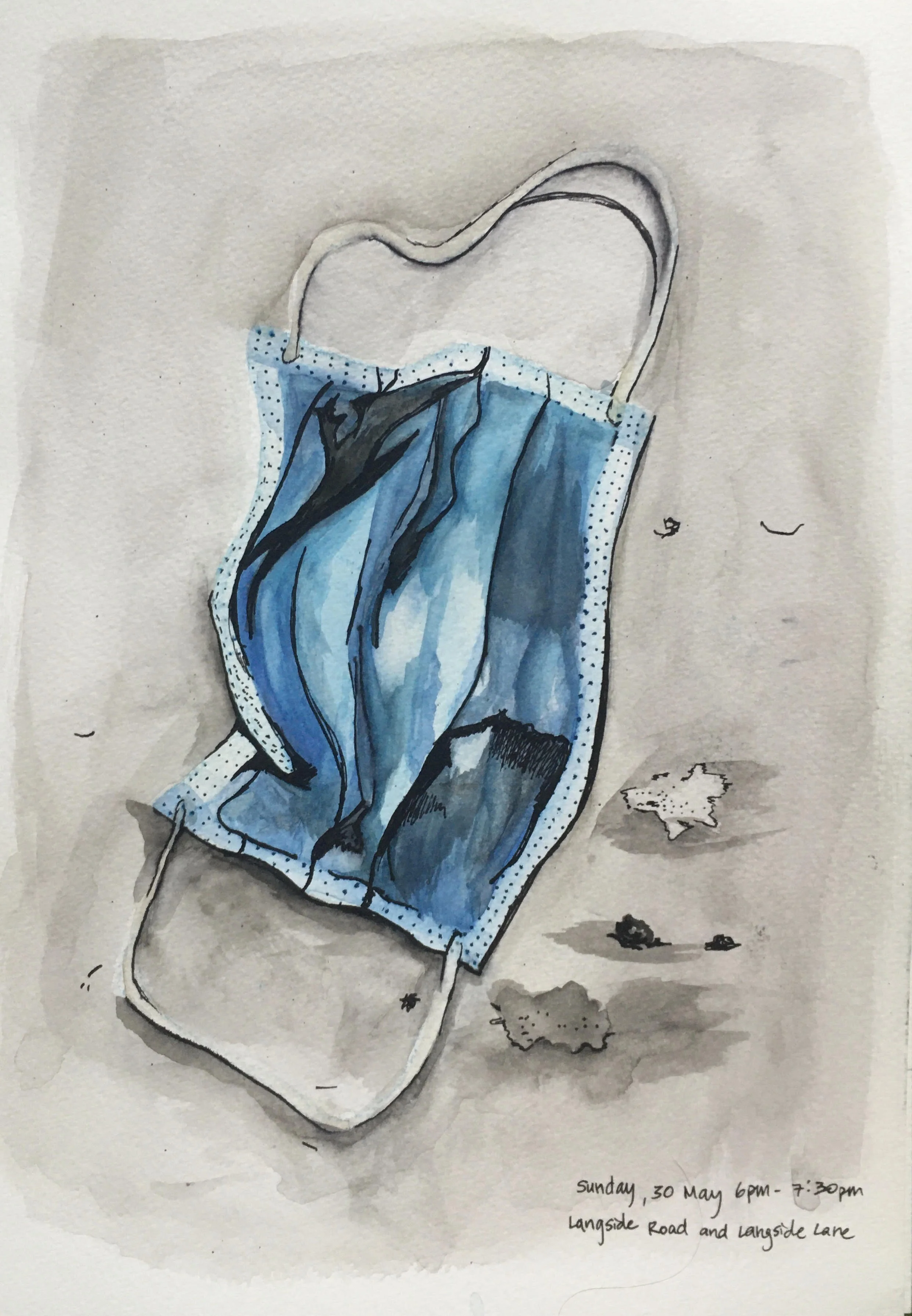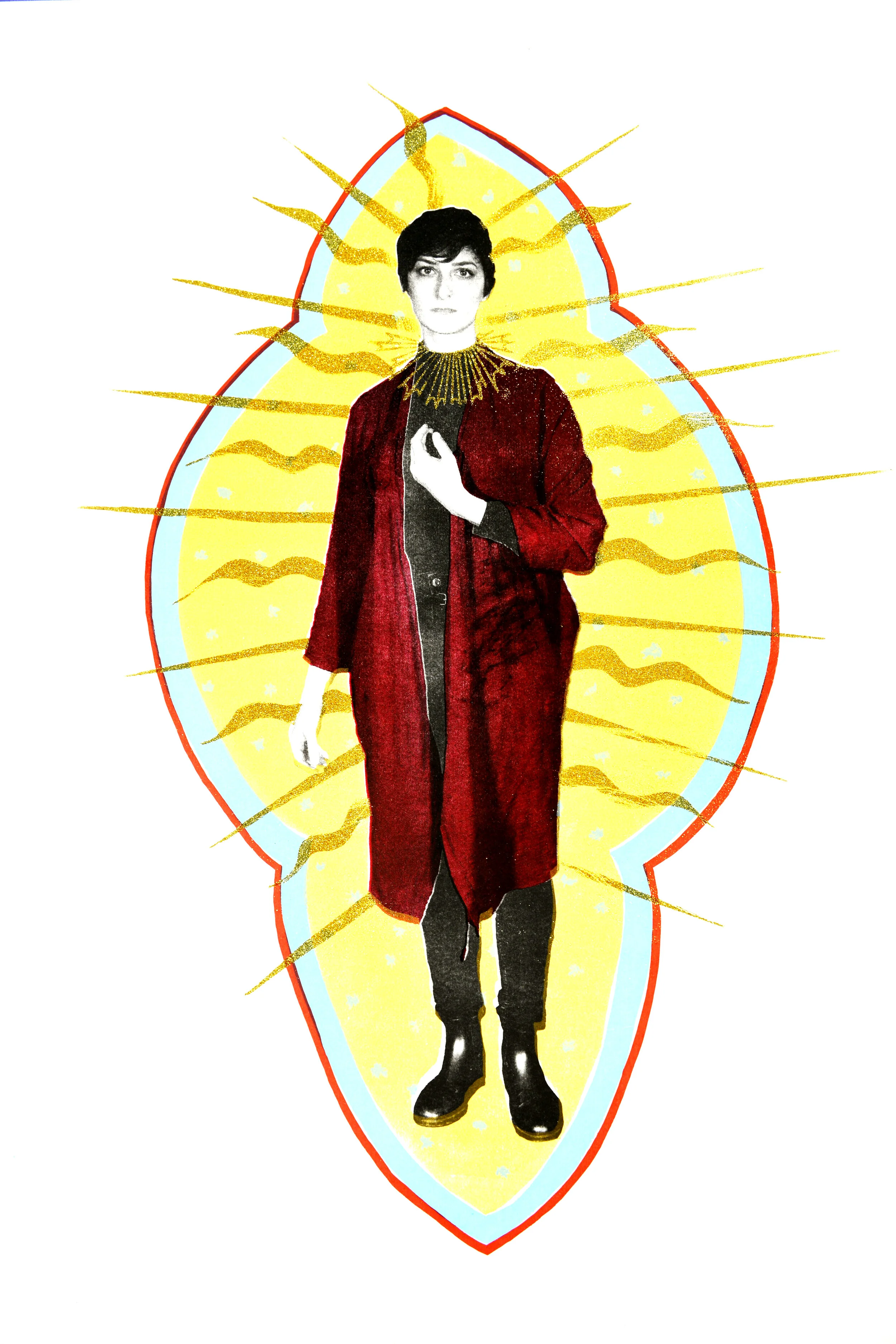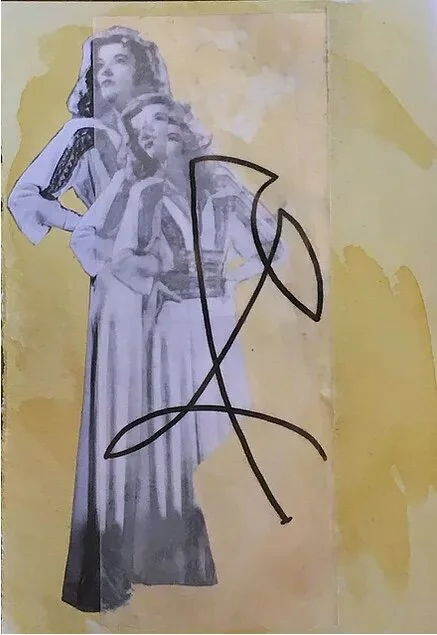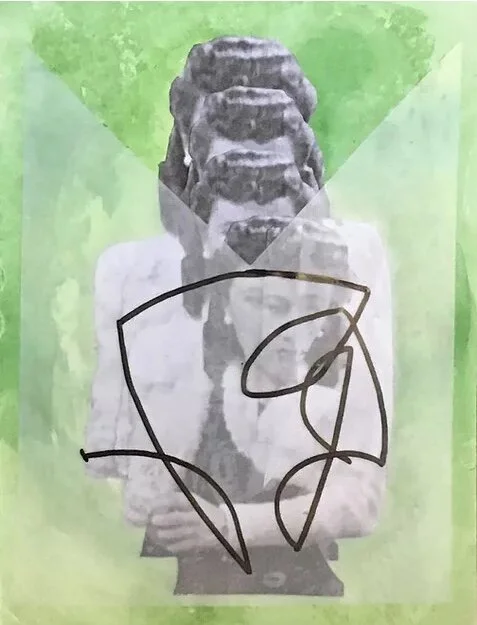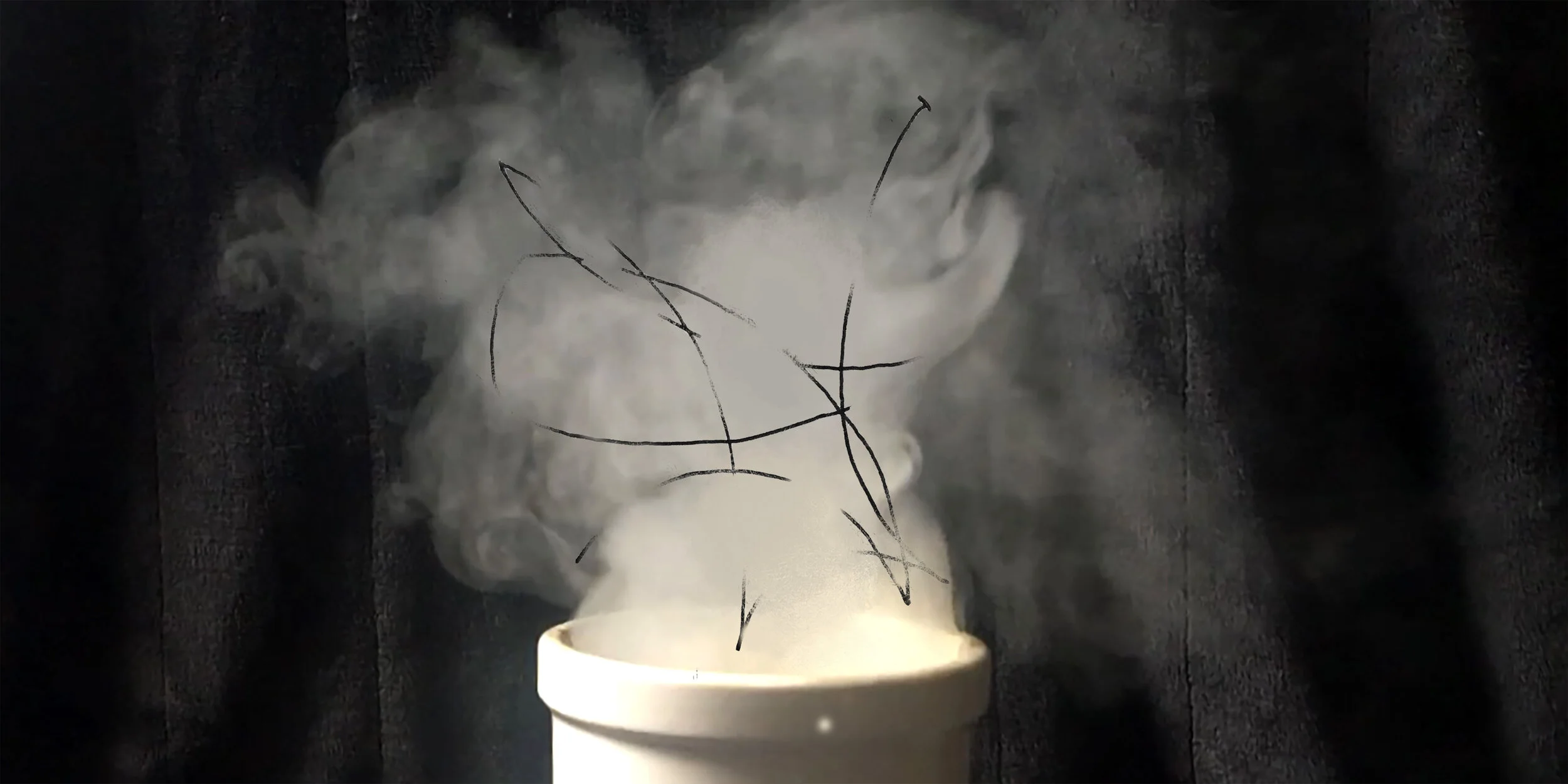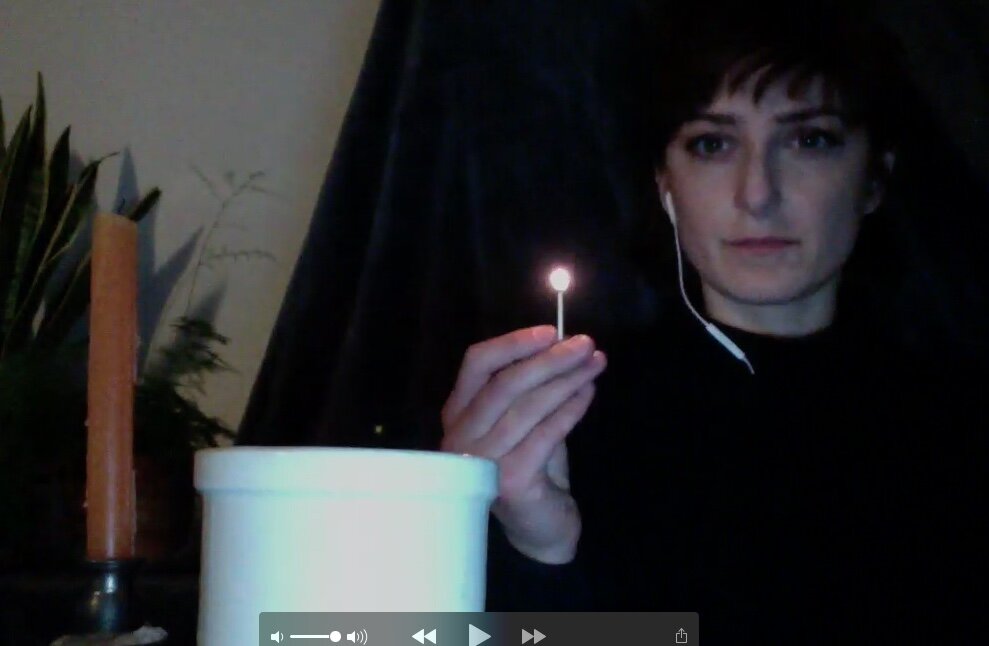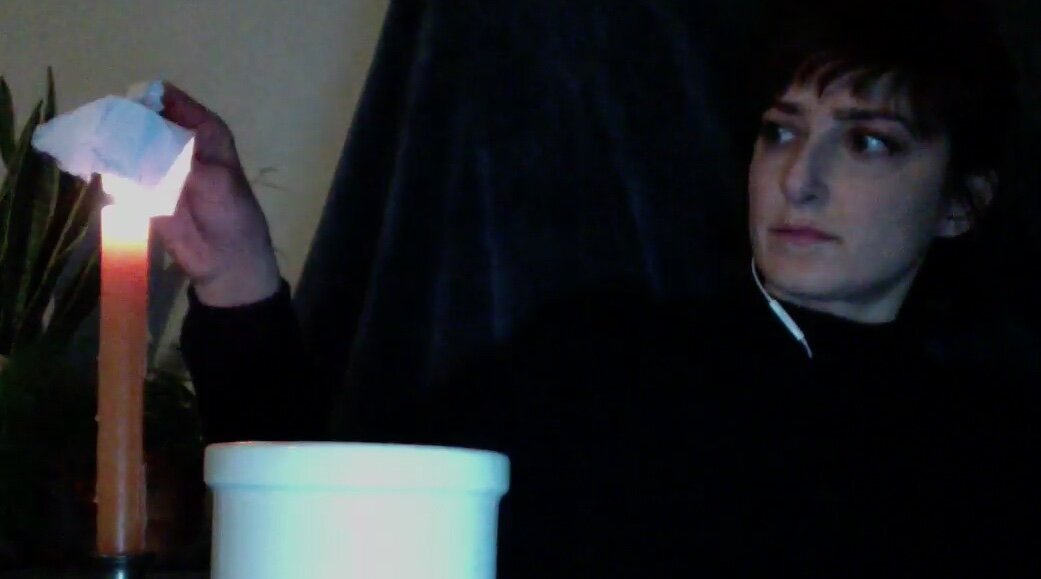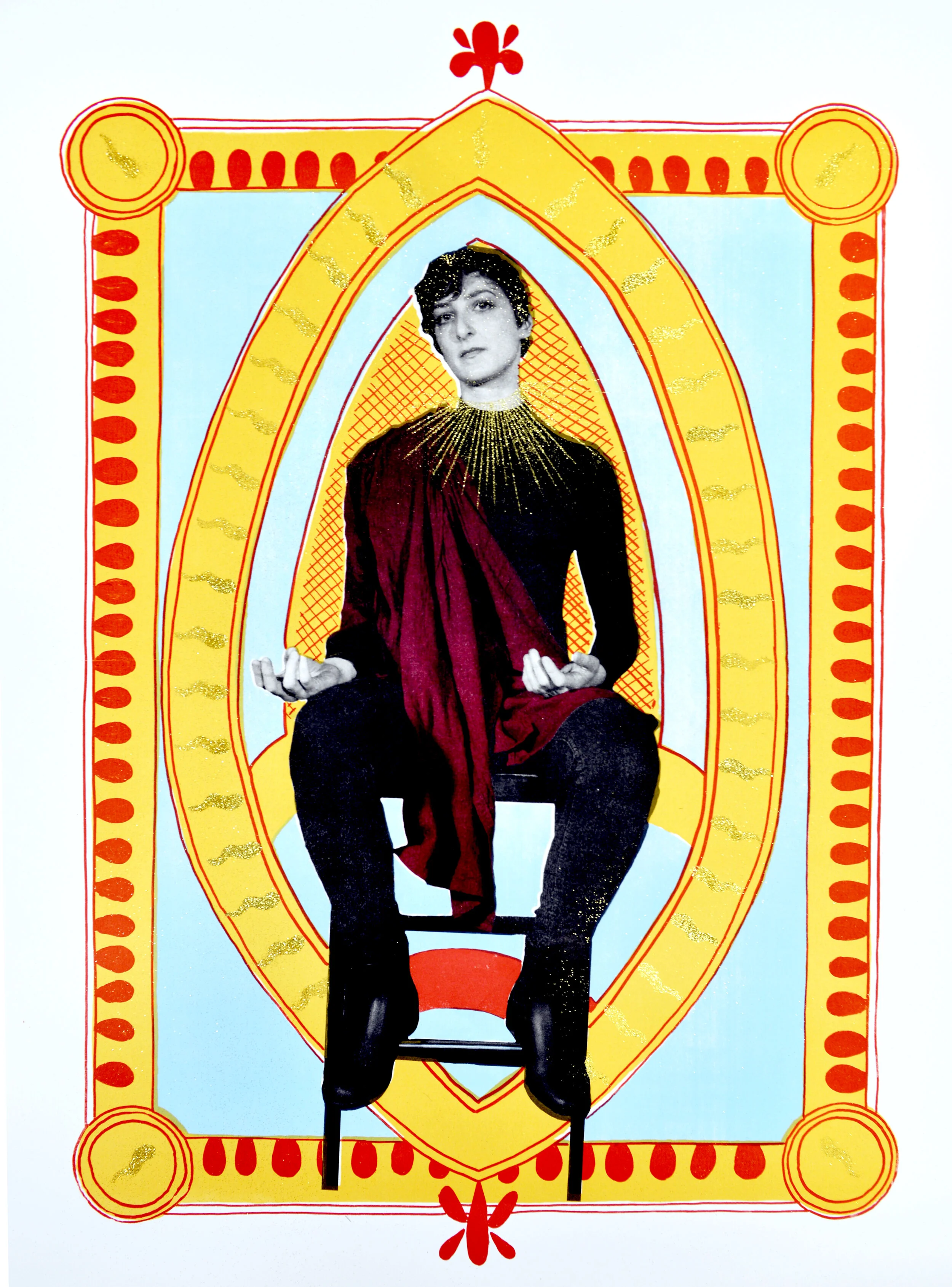Giacinta Frisillo
giacinta frisillo is an artist originally from New York who now lives and works in Glasgow, Scotland. We met during the Supernatural Women Residency in 2020, at the very beginning of her research for an artwork called Unspoken Desires. The final work was a series of one-to-one performances, a beguiling adventure that left the participant feeling full of hope, intrigue, and like they were valued by the artist.
giacinta talked to Cel del Nord about community, transformative moments in art, making lanterns by upcycling plastic, mysticism, catholicism and a desire for the ethereal.
Cel del Nord: You have done heaps of work in the community over the last few months.
giacinta frisillo: Yeah, I've been working with refugees and asylum seekers, doing therapeutic arts sessions with them. We've been doing a lot of that during COVID during lockdown, delivering all of these sessions online. It was a pretty big challenge in the beginning, but has gotten, I guess like everything else, somewhat normal at this point. I wasn’t not necessarily concerned that something beautiful would come out, but rather the importance of it and the conception of the actual work.
CdN: Is that the type of work that you prefer? I suppose I’m interested to know why is community important to you.
gf: I always assumed that I didn't like community based arts. I hate saying this, but I think I looked at it as a lesser, cute thing to do with kids. But working with the community I’ve realised that in fact I love working in that aspect. I guess I realised that it doesn't have to be separate from my own art practice. I think I was just completely wrong about that.
And, through the people I’ve met who are also working in Community Arts, this type of work has moved into the realm of contemporary, and important, and perhaps even life changing at times.
Assuming the Virgin, giacinta frisillo photo litho and screenprint, 2019
CdN: It's interesting to hear you talk about it that way. It brings to mind that kind of transformative moment that we would all hope for, as artists. That somebody experiences your work and is even slightly transformed.
There’s that ingrained idea that you hang the work up, and then go away and wait for somebody to come along and look at it and be transformed. Well, it's as if you've swept that notion off the table and said, ‘why don't we just do it together?’ And then, you get to be there for the transformative moment.
gf: Yeah. And I think that that's becoming who I am, as an artist. Rather than a person who makes art, which I have been my whole life, I think I'm becoming an artist. And I think what that means to me is not about my being an oil painter or being a printmaker, which I am as you know, but more about asking what are my concepts? And what are my values?
And don't get me wrong, I love going to see the same things in museums over again, and having my own personal experience with someone who perhaps lived 300 years ago. But within the world of contemporary art, we always need to be looking forward. And maybe that means finding a sense of collaboration and community within the actual creation rather than putting it up, walking away and expecting people to understand it. Not even expecting, really, it's even just hoping.
You know, you haven't got control over it. That's the truth – they say don’t they? That 10% is the art that you make, and 90% is the viewer's perception of it – so even when not you're collaborating with someone, everyone is bringing their own things to it, their own feelings, their own perceptions. But there's something about actually creating together that, I think, brings a bit of the Zeitgeist. It brings the moment into it, rather than my moment.
CdN: So this feels very much related to the mask paintings you have been doing, because you were painting the masks in relation to your own neighbourhood, and of course the masks are very much about now. How did that start?
Mask 2, giacinta frisillo 2021
Mask 5, giacinto frisillo 2021
Mask 6, gicinta frisillo 2021
gf: So, my neighbourhood Govanhill is notorious for garbage. If you do a Google image search for Govanhill you’ll likely be presented with a-hundred pictures of fly tipping. But there are ninety-five different languages spoken, it’s the most diverse area in all of Scotland, not just Glasgow, but Scotland. It's vibrant, it's got things going on, there young hip artists living next to families, Roma people and next to Pakistani people, and everything just intermingles. It feels like there's just people from everywhere doing everything and fitting in, in their own way, and I just love it! But the garbage is atrocious.
giacinta painting masks in Govanhill, where she lives.
So after a while, having to wear masks, I started seeing them on the ground – really conspicuously these blue surgical masks – with such a direct relationship to what we're all going through right now. And they’re degrading into microplastics and hurting animals. And kids in the neighbourhood use the streets as their playground. So, when they're out there, they're walking over these masks that contain a virus that is killing the world. I don't even feel like I can pick them up because it's this filthy thing that's been on someone's face. But it was something that I needed to draw some attention to. I started doing paintings outdoors of used masks, and as soon as I would set up my easel people would start coming over. People who would never have spoken to me, or maybe don't speak much English, and I don't speak their language, would say ‘masca?’, for example, which is the Roma word for mask.
It was actually breaking down some barriers. And little kids would come up to me and talk to me about it, asking me why I was painting a dirty mask, and I would say, ’Yeah, it is dirty, isn't it? And you shouldn't be having to play around this. You know, tell all the grownups don't throw stuff on the street.’
CdN: I like that, because we put so much extra distance between ourselves and other people during the pandemic. Not just security distance, but suspicion and judgement, so the idea that you've turned it on its head, and actually brought people in that you wouldn't have otherwise met, instead pushing away people is really beautiful.
gf: That didn't even occur to me. And I really appreciate you saying that. Because sometimes you're making work and you feel like, I know I'm doing this for lots of reasons but I can't name them all, and it takes someone else to identify something. In fact, I'm working on a stop motion video right now, for a different project. And, to me, it's all about isolation and intimacy. And now that you say that, I think maybe that is a lot of what this mask project is about. It's about isolation and intimacy.
CdN: If anything I experienced in the last year was both isolated and intimate it was your piece Unspoken Desires. Maybe you're working through that duality at the moment?
gf: I think we all are. I think it's very much been that for all of us. It's been a long, long time looking for ways to connect.
CdN: I will come back to Unspoken Desires, but while we’re still on litter, you also made a community piece that involved making lanterns from plastic bags, is that right?
gf: I did. I was working with Amalie Silvani-Jones. She started an event in Glasgow Open House Arts Festival, when she graduated from art school because there aren't a lot of opportunities for students when they graduate.
There are lots of different artists around the city who have chosen to do their own small scale exhibition – anything from something hanging in a window, to doing a performance in the backyard – it's a whole slew of things. And, she asked about working with community groups and whether I had a project that could engage people who don't consider themselves artists, specifically including reuse or upcycling type stuff.
CdN: How did you make the lanterns?
gf: Well, there's a way of fusing plastic bags, you know, ironing them makes this this crinkly fabric, almost. And it's pretty great. You can actually sew it together, and it's also really good for being outside because it's plastic so it's pretty indestructible.
The very first time I ever engaged with that was in New York in 2008 or 2009, and I was working with a neighbourhood arts and community group called Hester street collaborative in a community with many Chinese immigrants or children of Chinese immigrants. And it was around Lunar New Year, and lanterns are very popular around that time of year and we did this sort of upcycling, or reuse project.
So for Glasgow Open House I revamped it. It was a great way to use plastic waste. Not just plastic bags from shopping but other soft plastics, like those air packs they send will fuse together nicely. You can get really creative. And it's not something where you have to be an artist to do it, but I think that they're quite artistic when you look at them. Looking at them it feels kind of magical.
Assuming the Virgin, giacinta frisillo photo litho and screenprint, 2019
CdN: You said magical, so let's dive into Sigils. You started working on Unspoken Desires during the Supernatural Women residency November 2020 and performed it April this year and was so very magical. But rather than for groups it was one-on-one, right? It must have been a lot of energy for you?
“A sigil is a type of symbol used in magic. The term has usually referred to a type of pictorial signature of a deity or spirit. In modern usage, especially in the context of chaos magic, sigil refers to a symbolic representation of the practitioner’s desired outcome.”
gf: Yes, actually, I was legitimately pouring myself into bed, you know? It was really fulfilling, but also really, really draining. I was really trying to give myself to these desires and these hopes. Yeah, it was a lot. I would leave myself a half an hour between each slot just to kind of reset everything. I think I was leaving myself a half an hour to reset things physically. And it didn't really occur to me how much I was going to need to reset myself mentally and emotionally. I felt a lot of emotions but was trying really hard when I was delivering the performances to remain neutral.
CdN: So just to clarify, a participant would give you a personal desire ahead of time. Then, in a one-to-one video call you created their sigil using numbers, and then you burn the sigil and it doesn't exist anymore.
gf: That’s right
Kate, giacinta frisillo 2021
Barbara, giacianta frisillo 2021
CdN: And the idea is that by taking part in the ritual they increase the chances of the desire being realised?
gf: Yes, and I didn't want to appear judgmental of people's desires. I just wanted this desire to be a fact, and to let them experience their emotion because it was the participant who was letting themselves be extremely vulnerable. And the fact that we were face to face made it extremely intimate. I really applaud people for coming along and being willing to say all sorts of desires out loud to me.
CdN: Something I’m interested in hearing you talk about is how much of it is performance. It's not clairvoyance or mysticism, necessarily, but it definitely has that feeling of a power that we can't see that might exist. So I’m wondering to what extent it was real? Did you feel that you were actually creating something that could be real? Or was your performance of a character who thought that, but actually you don’t think so? I'm interested in where you draw the line?
Unspoken Desires, giacinta frisillo 2021
gf: I think it's my own scepticism of mystical and spiritual things that makes them so alluring. I so want that to be real. I so, so want that, yeah. In my conscious brain it’s not. But weird stuff happens all the time. And people are certainly connected to one another and to the environment in ways that are far beyond my actual ability to to reasonably explain. It would be narcissistic to think that I could possibly, truly know what is going on. And yeah, some things sound a lot crazier than others, but I really don't know.
And, I think this is actually something I grapple with a lot. It’s not a struggle, so much, but I grew up Roman Catholic and I grapple with that a bunch.
There were so many things that I found really unappealing about the whole situation, most specifically, of the way that women and girls were treated. But, I also think Catholicism gets very ingrained in you. And as much as I disagree with it it's in me. There are parts of it that I cling to in times of need, or that I still find comforting. And, and I think that that is probably the mystical element of it. Because we're humans, and the idea of there being something more is extremely alluring and comforting. I’ve been thinking a lot about the ability to contain the sacred within ourselves, and there’s this phrase that a friend of mine and I have been working on for a show that we have coming up. It’s our blessing, I guess, and it’s “You should know that you were born and you exist.” And I think that that is the best that any of us can do. To know that we exist, that we are here, we’ve got to do with it what we can. And I hope that there is something more beyond this, but I have no idea.
CdN: I’m thinking about you going to church every week. And having that interaction with people. Church is such a community interaction, too. And I am stuck on the idea that you're clinging to that
gf: I guess when my family was much, much bigger and they were all practising Catholics that went to the same church that I did it did feel a bit more like a community.
I don't really feel like I miss it. I don't have any desire to go to church, or whatever. There probably is something about the community aspect... I did actually go to church recently, for the first time in a long, long time. I went, because of the show that I'm trying to put on with a friend of mine – she's from Puerto Rico, the guy who's curating for us is from Italy, and I'm from the US and we're all lapsed Catholic, all have this sort of similar struggle with it' being part of us, but we're not part of it.
Well, I felt like I needed to go for research. And afterwards, when people were leaving, I could hear them chatting, saying ‘Oh, hey, it's nice to see you. I haven't seen you in a while,’ And the priest was outside chatting with people. And yeah, I mean perhaps I don't feel like I want to be a part of that community. But I'm sure people get lots and lots of support from that, and maybe I am trying to explore or even replace that somehow, in my life, or in my work.
CdN: Well Roman Catholicism has give you these two prongs – the community and the mysticism. And coming back to that line of thinking, whatever your sceptisms, you are saying that you weren’t acting. You were open to the potential mysticism even if you didn’t feel that you could necessarily bring it about.
Above - two stills from the interactive work ‘Unspoken Desires.’ 2021 by giacinta frisillo.
In these images giacinta lights a candle (top) to mark the beginning of a one-to-one session. She then burns the sigil that she has created for the participant (bottom) to activate the desire.
gf: Yes, that’s right. There are people who perform similar sigil rituals, and I did a lot of research to see how it happens. There are people in pagan faiths that perform this kind of thing. And I certainly didn't want to just be like ‘playing pagan’. It was important that it stayed an artistic performance, and that the participants knew that.
But I don't think it was one or the other, I think it was very much in between. It's something that I want to be real. I want to be able to find ways of connecting myself to be ethereal. I certainly don’t think it hurts to to put energy towards something.
Read more about giacinta’s work a giacintafrisillo.com
Assuming the Virgin, giacinta frisillo photo litho and screenprint, 2019

